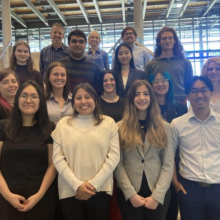UW SOC 403 research practicum immerses students in real world projects with local community organizations, schools, federal agencies and businesses. Projects address current issues, and the research outcomes have a direct impact on the organizations and communities they serve. The instructor acts as a project manager and supervisor, guiding student work throughout the quarter. Ultimately, however, students are responsible for the direction of their research and are expected to take the initiative to solve problems and move the project along.
The course exposes students to the research process from start to finish. It provides them experience investigating relevant literature, forming research questions, determining suitable methods, and ultimately collaborating to design the research project. Students then work as a team to execute the proposed study, by recruiting participants, collecting data (often via interviews or surveys), analyzing the data, writing a report, and giving a presentation to our community partners.
Last spring, we assisted our partner organization, the City of Seattle Office of Auditors, by conducting a study on how the rise in organized retail crime impacts employee safety. The students decided to conduct an interview-based study and spoke with individuals employed in the food and retail industries in the City of Seattle. At the end of the quarter, the students presented their findings to the partner organization and other City of Seattle employees at Seattle City Hall.
Other recent projects have utilized interviews and online surveys to focus on issues such as employee scheduling insecurity and the experience of undergraduate students during the COVID-19 pandemic. These projects prepare students for on-site work, conducting interviews, focus groups, surveys, content analysis and ethnographic research, to name just a few. A number of former students continue to work in research, with many moving on to work in government, policy organizations, or attending graduate school.
